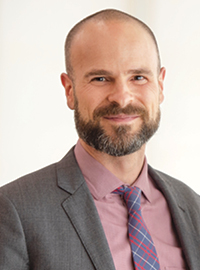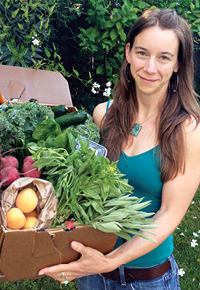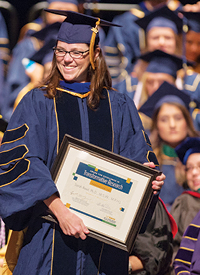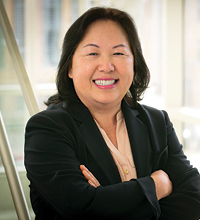Break tradition: Doctoral program welcomes multiple disciplines
Nursing research can be traced back to Florence Nightingale in the 1850s. She was not simply armed with a lamp, but with data to measure illness and infection rates among wounded soldiers during the Crimean War. The goal of nursing research is to improve outcomes and care for patients and families.
In order to expand the scope of impact, increase the ability to transform and account for different perspectives, the nursing science research program at the Betty Irene Moore School of Nursing at UC Davis innovates in its doctoral program. Since opening the Nursing Science and Health-Care Leadership Doctor of Philosophy program in 2010, every cohort includes registered and advanced- practice nurses, as well as scientists from other disciplines.
“Nursing science is not just research about nurses and nursing. It is a holistic approach to health and health care research,” explains Janice Bell, School of Nursing associate dean for research and doctoral program director. “The problems that nursing science can solve are not the challenges of nurses alone. They belong to multiple disciplines, many of which are reflected in our doctoral cohorts.”
From social workers and pain management specialists to food policy analysts and technology- sector entrepreneurs, participants in the doctoral program leverage the expertise contained within the Nursing Science and Health-Care Leadership graduate group. That interprofessional team is composed of more than 60 faculty members from disciplines including nursing, medicine, health informatics, nutrition, biostatistics, pharmacy, sociology and public health.
“Our doctoral students with expertise beyond nursing see health care’s challenges in new ways, which can be groundbreaking,” Bell adds. “Innovation comes when multiple disciplines join to examine problems from multiple perspectives.”

Art as pain remedy
Ian Koebner, PhD Class of 2017, Integrative Pain Medicine Director, UC Davis Health
Ian Koebner needed a curriculum designed to build the skills to facilitate collaborative problem solving. An acupuncturist and integrative pain management specialist, Koebner chose the School of Nursing and sought mentorship across the UC Davis campus and beyond.
His dissertation, Art Rx, uniquely partnered an academic health center with a local art museum to examine how art could improve pain management and reduce social isolation for those with chronic pain. His dissertation chair, Jill Joseph, a School of Nursing professor and physician, calls Koebner’s work “a good example of the contribution of unique backgrounds to innovation.”
“Chronic pain is a major health care problem necessitating collaborative and interdisciplinary solutions,” adds Koebner.

Food as prescription for health
Ronit Ridberg, PhD Class of 2018
Ronit Ridberg has worked to improve public health and reduce health disparities for more than 15 years, as a food systems policy consultant, researcher and documentary producer. She entered the School of Nursing to evaluate programs that combine nutrition education with incentives such as prescriptions for healthy food purchasing, and to describe their impact on food security and dietary behavior.
“With my work at the intersection of nutrition, health care and food policy, I chose this school because of its real focus on interdisciplinary and inter- professional training,” Ridberg says. “I’d like to build my career conducting applied research at this intersection of disciplines, to inform and influence national policy.”

Fear of cancer recurrence
Sarah Reed, PhD Class of 2017, Assistant Professor, Jane Addams College of Social Work
When Sarah Reed entered the doctoral program at the School of Nursing, she says she was “blown away” by the vision and risk-taking involved with admitting academically and professionally diverse students. As an oncology social worker, she was frustrated with how systems-level issues were affecting patients and families. Her dissertation focused on fear of recurrence among cancer survivors and enabled her to work with experts in biostatistics, epidemiology, medicine, nursing and public health.
“There are far fewer differences between disciplines than the silos suggest,” Reed says. “The interdisciplinary educational model supports where we need to be headed, fast.”

Data as a tool to end disparities
May Ying Ly, PhD Class of 2017, Postdoctoral Research Associate, Women + Girls Research Alliance at the University of North Carolina at Charlotte
When May Ying Ly was asked to assist in developing a cervical cancer prevention program for the Sacramento Hmong community, she quickly agreed to the project. A leader in the Hmong community and a Hmong refugee herself, Ly recognized the challenges: there is no simple translation for the term “cervical cancer” in the Hmong language and Hmong people do not discuss death. This challenge ultimately led the social worker to pursue a doctoral degree. For her dissertation, Ly applied an algorithm to infer Hmong ethnicity from electronic medical records. She discovered cardiovascular disease is more prevalent among Hmong-American men than in the broader Asian-American population.
“As a social worker, I know that interprofessional collaboration is necessary to make a difference,” Ly said. “We have to be able to understand the perspectives of the community.”

